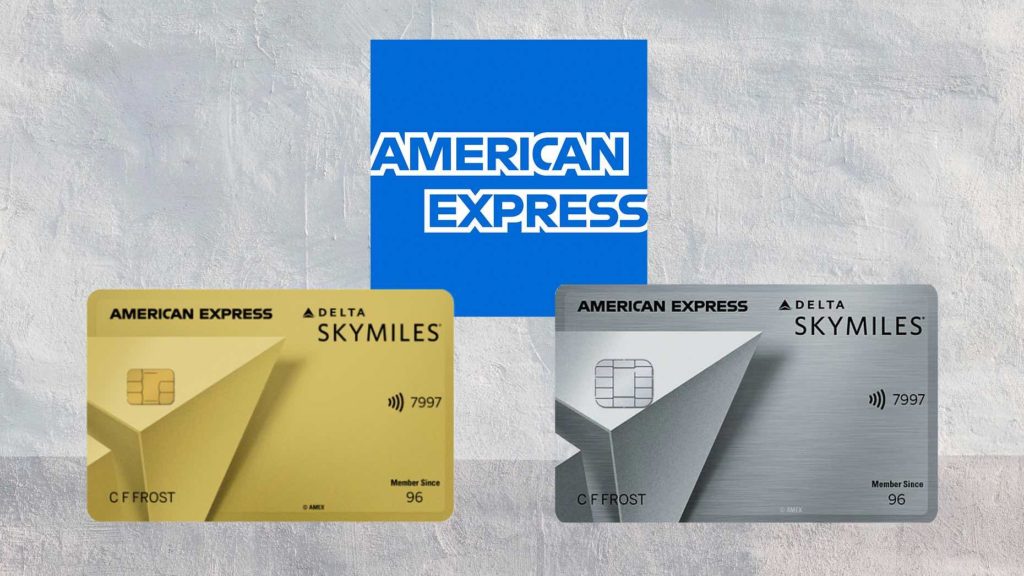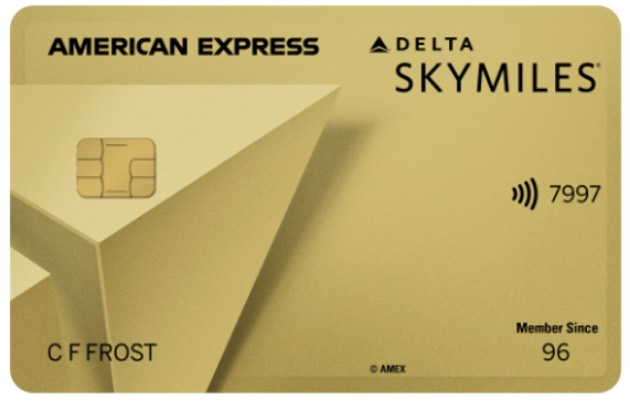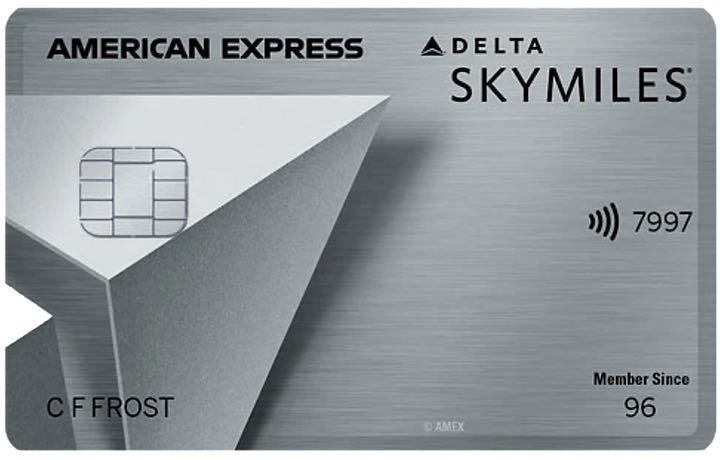by Daniel | Last Updated March 5th, 2022

We may earn a commission for purchases using our links, at no cost to you.
Do you like to travel a fair amount and are looking for a way to get a bit more value from your everyday spending so you can travel even more?
If the answer to this question is yes, then either of the two cards in this review may well be a good fit for you.
In this article, I’m going to review and compare the Delta SkyMiles Gold American Express Card and the Delta SkyMiles Platinum American Express Card.
Basically, I’ll look at the cost of each card, what the sign-up bonus is, benefits, and user perks and then I’ll make a decision on which card is the better choice.
Who are these cards good for?
Clearly, these cards are targeted at people that tend to fly with Delta airlines and are looking for a way to get more value.
Currently, both cards are offering a great sign-up bonus that is each worth at least $700.
One thing to keep in mind if you are considering a Delta Skymiles card is whether Delta actually has a Hub at your home airport, as this could be a factor in the decision you make.
Also, it’s worth considering if you will use all of the benefits of the card you prefer.
If you know you won’t make use of most of the benefits, it could end up costing you money and therefore creating a net loss in terms of value.
APR And Other Fees
Now for the next section of this review, I’ll be looking at the APR and associated fees that come with these cards, and in this instance, both cards have exactly the same APR.
So for purchases, the APR starts at 15.74% and goes up to 24.74%
If you apply for a cash advance you will be charged an APR of 25.24%, and there will be an additional charge of either $10 or 5% of the total amount of each cash transfer, depending on whichever amount is more.
If for any reason you make one or more late payments on your card or your payment is returned by your bank you will have your APR lifted to 29.99%.
And generally speaking, this rate will stay on your account for at least 6 months, if you are able to make payments on time with no return payments from your bank for at least 6 months, AMEX may remove the penalty APR back to the normal rate.
And then finally there is a fee of up to $40 for any late payment or returned payment.
Also, it’s worth considering that these rates will vary on a few different factors such as what your creditworthiness is and what the Prime Rate is at the given time.
Annual Fee
Next up, let’s see what the annual fee is for each of these cards and if there is much difference.

So starting with the cheaper of the two cards, the Delta SkyMiles Gold American Express Card is actually free for the first year of card ownership, after this, you will incur an annual fee of $99.

Next up, with the Delta SkyMiles Platinum American Express Card, there is an annual fee of $250, which is quite a lot more than the Gold card, but as you will see later in this review, it does offer a few more benefits that are not available with the Gold card.
Sign-up Bonus
So now one of the more important parts of this review is what the sign-up bonus is with each of these cards.
And it’s worth noting that both of these cards are currently offering an increased signup bonus that is available until the 13th of April 2022.

So starting with the Gold card you will be able to earn 70,000 bonus miles after spending $2,000 on purchases within the first 3 months of card ownership, and this is a lot more than the usual 40,000 bonus miles you get.
And seeing that Delta Skymiles are worth about 1.1 cents per mile, the 70,000 bonus miles are worth approximately $770.
Which, for a card with no annual fee the first year is really good value.

Next up, with the Platinum card, the sign-up bonus is currently 90,000 bonus miles, which is a lot more than the usual sign-up bonus of 50,000 bonus miles.
And with miles being the same value of 1.1 cents per mile, the 90,000 bonus miles are worth about $990.
So due to the limited-time offer that has almost doubled the sign-up bonus, both of these cards are offering fantastic value.
The bonus miles will easily cover the cost of the annual fee and will leave you with a ton of valuable miles to use.
Earning Miles
Now for this section of the review, I’ll go over how each card differs in terms of earning miles.

So starting with the Gold card you can earn 2x miles on purchases that are made at US restaurants, at US Grocery stores, and any bookings made directly with Delta.
And then all other purchases will receive 1 mile per dollar spent.
So every $5,000 you spend on a category that receives 2x miles is worth about $110, and for every $5,000 you spend that receives 1x miles is worth about $55.
Assuming you can spend at business categories that offer 2x miles, you will need to spend about $5,000 per year to cover the cost of the annual fee when it kicks in for the second year.

Next up, with the Platinum card, the main difference is that you can earn 3x miles for purchases made with Delta and directly with hotels.
And then 2x miles at US restaurants and at grocery stores.
And then all other purchases receive 1 mile per dollar spent.
So unless you travel a lot with Delta or you stay at hotels quite often, the ability to earn more miles with the Platinum card won’t make much of a difference.
However, if you do know you will utilize the higher miles earnings, $5000 spent a 3x miles will be worth $165, which is not too bad.
So you would need to spend just over $7,000 each year to cover the annual fee, based on earning 3x miles.
Benefits and User Perks
So for this section of the review, I’m going to go over all of the benefits and perks, and insurance that comes with each card.
And this is where you will notice a pretty decent difference in value between both cards.

And starting with the Gold card, some of the more notable benefits that come with this card are a $100 Delta Flight credit after you spend $10,000 in purchases within a calendar year.
You will also receive your First Checked Bag Free on all Delta Flights, and whenever you use 5,000 miles or more to pay for a flight, you will receive up to $50 Off the booking.
And when flying with Delta, you will receive 20% back in statement credits for any food, beverages, or audio headset purchases.
And on Delta flights, you and up to 9 people traveling on the same reservation will be able to use priority boarding.
So as an example, if we combine the three benefits that include a return flight, that is booked with at least 5,000 bonus miles, and at least $10,000 has been spent on the card over the year, together, they are worth approximately $210.

Next up, With the Platinum card, the most valuable benefit that you get is an Annual Companion Certificate.
And this is available to you after the renewal of the card for the following year.
And this can be really quite valuable, although it is worth noting that you can only book tickets that are in L,U,T,X or V classes, which are not available on all flights, on Delta.com, there are flights that are available from JFK to LAS (Las Vegas) that cost well over $400 for a return ticket.
The only thing you will need to pay for when using this benefit is any associated taxes and fees, which is capped at $75.
So just this benefit alone is potentially worth quite a bit more than the annual fee of the Card.
If you purchase either Global Entry or TSA PreCheck, you will receive up to $100 back in the way of a statement credit.
Similar to the Gold card you will also receive your first checked bag free of charge and you will get the same 20% back for purchases made on Delta flights of food, beverages, and audio headsets.
There is the ability for you and up to 2 guests to purchase access to the Delta Sky Club on the same day that you are all flying on a Delta-marked flight.
And the cost for each person will be $39.
As with the Gold card you will also have access to priority boarding on Delta Flights.
And finally, if you spend $25,000 or more in a calendar year, you can earn 10,000 Medallion Qualification Miles, which brings you closer to Medallion status.
So assuming you use the companion certificate for a flight that is $400 (then minus $75 for the Taxes) that’s $325, then a $100 credit for TSA Precheck or Global entry, and then the first checked bag free for a return flight which is about $60.
This works out to be a value of approximately $485, which is more than double that of the Gold card and doesn’t take into account the ability to gain access to the Delta Skyclub and earn MQMs.
Insurance Related Coverage
So for the next section of this review let’s go over all of the insurance-related benefits that come with both of these cards, and you will see that they both offer pretty much the same coverage, but the Platinum card offers one extra benefit.
So both cards have Car Rental Loss and Damage Insurance of up to $50,000 which helps to cover the cost of any damage or theft of a rental car.
And for this to be valid you must have paid for the entire rental with the card and then decline the collision damage waiver that is offered to you by the rental agency.
Again, with both cards, you will receive a Baggage Insurance Plan that covers up to $500 for checked bags and up to $1250 for carry-on luggage, and this covers lost, damaged, or stolen bags.
There is an Extended Warranty with both cards that provide you with 1 additional year of warranty on purchases from within the United State and that also have an original warranty of 5 years or less.
And both cards also offer the same Purchase Protection of up to 90 days on new purchases that covers up to $1,000 per occurrence and $50,000 per Calendar year.
The only main difference between the two cards when it comes to insurance coverage is that with the Platinum card you will get Trip Delay Insurance of up to $300 if your trip is canceled for more than 12 hours, and there is a maximum of 2 claims per eligible account per 12 consecutive month period.
Final Thoughts
So finally, what are my thoughts about both of these cards? As with most credit cards, it depends on how much you are willing to pay for a card, and what benefits you will actually use.
Both of these cards have similar benefits and insurance coverage, but obviously, the Platinum card comes out on top in terms of value.
If your budget allows for the extra cost of the Platinum card, and you know you will utilize all of the benefits, such as the companion certificate, TSA Precheck or Global Entry, then it makes sense to pay the higher price for the annual fee, as you will definitely be able to make up for the cost with the added benefits the card has.
Now, this doesn’t mean that the Gold card isn’t good.
I still think it offers some great value, and costs quite a bit less, especially seeing that the first year of card ownership has no annual fee.
If for any reason you were not sure which card to choose, you could start with the Gold card, and then, if you really like it you could upgrade to the Platinum card the following year.
Anyway, that pretty much wraps up my review and comparison of these cards.
Now if you are interested in an even more valuable Delta Skymiles card, what not check out my review of the Delta Skymiles Reserve American Express Card here.
